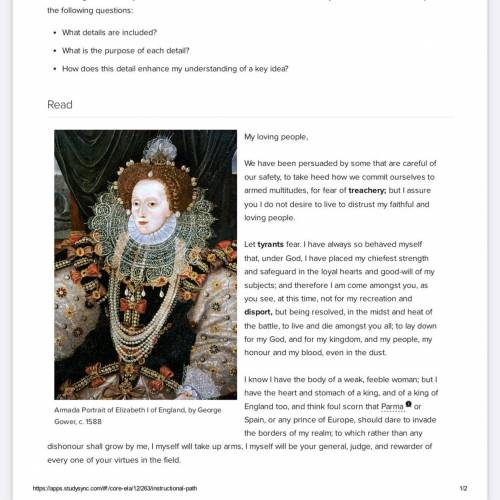

Answers: 1


Another question on English

English, 21.06.2019 23:10
Question 5 the poet protests against child labor and condemns the harm done to children exploited in this practice. yet in lines 23-24, the child narrator writes that “tho' the morning was cold, tom was happy and warm / so if all do their duty, they need not fear harm.” this is an ironic expression of the narrator’s
Answers: 1

English, 22.06.2019 02:30
100 points and brainiest for if u go to my previous questions u can answer the 100 pointers think of an intense argument you had or witnessed sometime in your life. close your eyes and remember every detail. to turn this into a dramatic scene you will need to make changes that will make it make more sense to the audience. 500-600 words a description of the set up that explains what happened before the scene diction that matches the characters character objectives and obstacles are clearly conveyed a scene that escalates in dramatic intensity diction that is appropriate to the audience words that are not wasted in idle chit chat action (stage directions) that enhance the scene proper formatting for drama
Answers: 1

English, 22.06.2019 03:10
Which literary device does orwell most use to support his purpose in writing in this passage? characters, to show that what happens on the farm is fiction allegory, to show similarities between the farm and the soviet union point of view, to show how the characters think about the murders setting, to show that events in the soviet union may have been caused by the economy
Answers: 2

English, 22.06.2019 07:00
Read the passage. excerpt from "why equal pay is worth fighting for" by senator elizabeth warren, april 17, 2014 i honestly can't believe that we're still arguing over equal pay in 2014. when i started teaching elementary school after college, the public school district didn't hide the fact that it had two pay scales: one for men and one for women. women have made incredible strides since then. but 40 years later, we're still debating equal pay for equal work. women today still earn only 77 cents for every dollar a man earns, and they're taking a hit in nearly every occupation. bloomberg analyzed census data and found that median earnings for women were lower than those for men in 264 of 265 major occupation categories. in 99.6 percent of occupations, men get paid more than women. that's not an accident; that's discrimination. the effects of this discrimination are real, and they are long lasting. today, more young women go to college than men, but unequal pay makes it harder for them to pay back student loans. pay inequality also means a tougher retirement for women. . for middle-class families today, it usually takes two incomes to get by, and many families depend as much on mom's salary as they do on dad's, if not more. women are the main breadwinners, or joint breadwinners, in two-thirds of the families across the country, and pay discrimination makes it that much harder for these families to stay afloat. women are ready to fight back against pay discrimination, but it's not easy. today, a woman can get fired for asking the guy across the hall how much money he makes. here in the senate, sen. barbara mikulski (d-md.) introduced the paycheck fairness act to give women the tools to combat wage discrimination. it would ensure that salary differences have something to do with the actual job that they are doing, and not just because they are women. senator warren states that the effects of pay discrimination are long-lasting. is this a valid argument supported by accurate evidence? no; warren weakens her point by claiming that the paycheck fairness act would "give women the tools to combat wage discrimination." yes; warren supports her point by noting, "for middle-class families today, it usually takes two incomes to get by." yes; warren supports her point by noting, "pay inequality also means a tougher retirement for women." no; warren weakens her point by noting, "today, a woman can get fired for asking the guy across the hall how much money he makes."
Answers: 3
You know the right answer?
Determine the key ideas to the following questions Read Speech to the troops
What details are incl...
Questions



Mathematics, 29.05.2020 04:57




Mathematics, 29.05.2020 04:57



Mathematics, 29.05.2020 04:57




Mathematics, 29.05.2020 04:57





Mathematics, 29.05.2020 04:57

Mathematics, 29.05.2020 04:57




